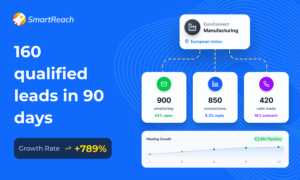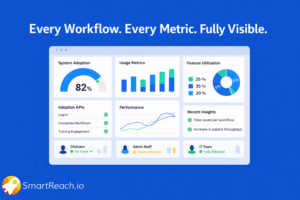8 Best Small Business Phone Systems (Tested & Reviewed)
For decades, small businesses relied on traditional landlines and PBX systems to communicate with customers and clients.
But in 2025, those setups are rapidly being replaced by cloud-based VoIP (Voice over Internet Protocol) phone systems, also commonly referred to as business phone systems.
What makes today’s systems stand out is the rise of AI-driven features.
Most modern AI-based business phone tools don’t just provide a dialer, they answer queries, capture leads, take a message, summarize calls, transcribe voicemails, analyze sentiment, and even trigger follow-up actions automatically.
For small businesses, that means less manual work, faster response times, and smarter decision-making.
In this guide, we’ll compare the 8 best business phone systems for small businesses.
Each tool has different strengths: some are lightweight and budget-friendly, others are packed with advanced features like AI and global calling.
By the end, you’ll know which phone system fits your company’s size, goals, AI requirements and workflows
TL;DR: 8 best small business phone systems (comparsion)
| Tool | Top features | Price | Unlimited US/CA Calls | Number Porting | AI features |
| dialnote | Shared Number,Shared inbox, IVR, Adv Routing, Auto Call Classifier | Coming soon | Yes | Yes | Strongest – AI Auto-answerAI SummariesAI CRM UpdatesAI Call TagsAI Call Quality Evaluation |
| RingCentral | Voice, video, team messaging, analytics | $20/user/month | Yes | Yes | Basic – analytics and performance insights |
| Nextiva | Unlimited calling, voicemail-to-email, analytics | $23/user/month | Yes | Yes | Basic – voicemail transcription |
| Grasshopper | Business numbers, forwarding, texting | $18/user | Yes | Yes | None – no AI capabilities |
| Vonage | 40+ features, CRM integrations, APIs | $20 – $30 | Yes | Yes | Basic – depends on integrations with AI tools |
| Dialpad | Real-time transcriptionCRM sync | $27 | Yes | Yes | Strong – live transcription, AI notes, sentiment analysis |
| OpenPhone | Shared inbox, texting, integrations | $19/month | Yes | Yes | Basic – voicemail transcription |
| 8×8 | Calling analytics, voicemail | $15 | Yes | Yes | Basic – speech analytics and call insights |
Want the full comparison of these VoIP calling tools with detailed breakdowns?
Click here to skip to the detailed review ↗
What is a modern business phone system and why choose VoIP?
A modern business phone system (cloud/VoIP) runs over the internet and combines calling, texting, voicemail, and often video and team messaging without traditional PBX hardware.
Small businesses choose VoIP phone systems for lower cost, faster setup, mobile-first apps and integrations with CRMs and helpdesk tools
What makes a business phone system ideal for small businesses?
Before diving into the top providers, it’s important to know what to look for in a business phone system.
The best small business phone tools usually have these qualities ⤵️
- AI features: AI call summaries, AI message responses, AI call transcription etc. that help small teams stay productive in calling management.
- Cost-effectiveness: Affordable plans that don’t sacrifice features.
- Scalability: Ability to grow with your team without switching platforms.
- Ease of use: Simple setup with minimal IT expertise required.
- Remote-friendly: Cloud-based systems that support mobile work.
- Professional features: Call routing, auto-attendant, voicemail transcription, integrations with CRM and email.
These criteria are what small businesses typically prioritize when choosing their communication platform.
What are the best business phone systems for small businesses?
Here’s a breakdown of the top 8 business phone systems that small business owners should consider.
#1. dialnote
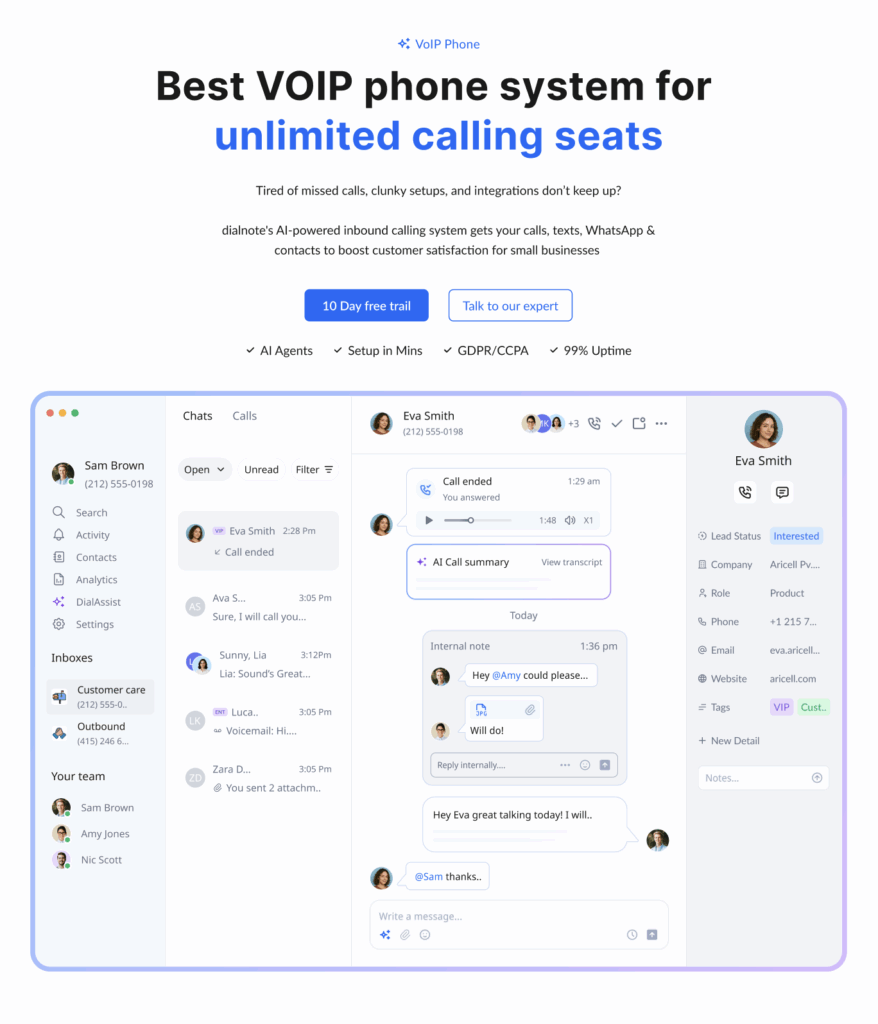
What is dialnote?
dialnote is a modern, AI-powered inbound VoIP calling platform designed to disrupt the business phone system market.
More than just a calling app, it transforms phone conversations into automated workflows and actionable insights.
dialnote ensures reliability while giving businesses unique pricing flexibility either predictable per-seat billing or an unlimited-seats option that can scale effortlessly with teams.
Top features of dialnote
- Calling number: Get toll-free, local, and international numbers, with free number porting. Enjoy unlimited US/Canada calling, transparent zone-based global rates, and unlimited inbound/outbound numbers for growing teams.
- Shared inbox for calls and texts: Teams can see every message and voicemail in one place, assign conversations, and leave internal comments.
- AI-powered call handling: Auto-answering agents, AI call summarization, AI sentiment analysis, AI call tasks and CRM actions (like ticket creation or lead updates) reduce repetitive tasks.
- Workflow automation: Trigger automatic follow-ups via WhatsApp, SMS, or email based on call outcomes and dispositions.
- Robust call management: Includes IVR, intelligent call routing, voicemail transcription, call recording, and in-depth analytics.
- Comprehensive integrations: Works smoothly with popular CRMs(e.g., HubSpot), helpdesks(e.g., Zendesk), communication tools(e.g.,Slack), and business apps, with API and webhook support for custom workflows.
- Mobile and desktop apps: Employees can work from anywhere without being tied to a physical office.
Who it’s for: Ideal for SMBs, startups, and growing teams that need scalable phone systems without per-seat costs. Perfect for internal business teams, sales and customer support teams handling high call volumes and international businesses seeking cost-effective global communication.
How will “dialnote AI” helps businesses?
Dialnote AI works as an intelligent automation layer for business phone systems, handling calls end-to-end to save time and improve results.
Its features focus on 5 main areas:
- Drive sales & capture leads: AI Auto-answer, lead capture, appointment scheduling, SMS follow-ups, and AI contact suggestions help ensure prospects are qualified and meetings are booked without delays.
- Maximize agent productivity: AI transcription, AI call summaries, auto CRM updates, and AI disposition codes reduce manual data entry and routine admin work for teams.
- Better customer experience: Branded AI voice agents, multilingual support, and automated responses provide faster and more consistent service for every caller.
- Gain actionable intelligence: Features like AI call tags, AI evaluations, and AI call summaries give managers insights into call reasons, agent performance, and customer sentiment.
- Streamline operations: Automated transfers and disposition codes make sure calls are routed correctly and workflows are triggered without extra effort.
Overall, Dialnote AI is designed to make phone systems more efficient, helping small businesses save time, improve service, and use call data for better decisions.
What I liked about dialnote
What stood out to me right away was the transparency of its pricing model.
Many providers market “unlimited” plans that come with hidden restrictions, but dialnote avoids that trap. Its bundle-based approach feels more honest and predictable, something small business owners will appreciate.
Another highlight is the AI-powered workflow automation. Unlike surface-level AI features, dialnote’s integration is deep. It can handle AI call summarization, AI sentiment tracking, and post-call CRM updates automatically. This directly boosts team productivity by turning every call into actionable data.
Finally, I liked the flexibility of customization. Businesses can choose their pricing path and bolt on only the features they need. Whether it’s a startup with five users or a small business planning to scale globally, dialnote adapts without forcing you to overpay for features.
dialnote Pricing: “Coming Soon”
Why choose dialnote?
dialnote is designed for businesses that want more value without overspending on features.
It offers enterprise-level reliability, automation, and AI features at a fraction of the cost of big-name providers.
While competitors like OpenPhone and Dialpad limit flexibility through per-seat charges or premium AI-only plans, dialnote’s dual pricing paths, integrated AI workflows, and clear cost structure give SMBs the freedom to scale without financial surprises.
👉🏼 Sign-up and try dialnote for FREE
__________________
#2. RingCentral
- G2 Rating: 4.2/5 (2710 reviews)
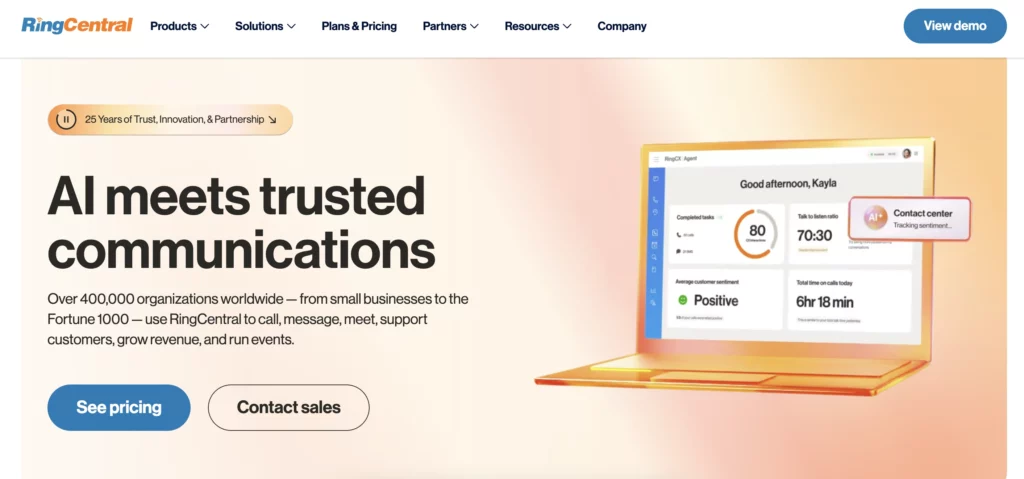
What is RingCentral?
RingCentral is one of the largest and most established VoIP providers, offering a full Unified Communications as a Service (UCaaS) platform. It includes phone, messaging, video conferencing, and integrations in a single package.
Top features of RingCentral
- HD voice calls and video meetings in one platform
- Team messaging and file sharing for internal collaboration
- Auto-attendant and IVR menus to direct calls professionally
- Advanced analytics and reporting for call performance
- CRM and productivity integrations with Salesforce, Google Workspace, and Microsoft 365
- Scalable plans for both small businesses and enterprises
Who it’s for: Small teams that plan to scale into mid-size companies and want a system that can grow with them.
AI features in RingCentral
- Real-time transcription during phone calls, meetings, and messaging.
- AI-powered meeting summaries with highlights and action items.
- Intelligent virtual assistants (IVAs) for customer self-service and call routing.
- Automated quality management with sentiment tracking and coaching tips.
- AI Assistant for drafting messages, translations, and message recaps.
What I liked about RingCentral
RingCentral stands out for its all-in-one communication hub.
I liked how seamlessly it integrates voice, video, and team messaging in one place – fewer apps, fewer headaches.
The auto-attendant and IVR features give even small businesses a polished, professional feel when customers call.
Another plus: the robust integrations with tools like Salesforce and Google Workspace, which streamline workflows for sales and support teams.
Drawbacks of RingCentral
- Slightly more complex setup compared to lighter tools.
- Can feel expensive for very small teams.
- Some advanced features require higher-tier plans.
- Support response times can be inconsistent.
RingCentral Pricing:
RingCentral’s plans generally start around $20–$30 per user/month, with higher tiers offering call analytics, advanced reporting, and global features.
Why choose RingCentral?
If your business wants all-in-one communication (voice, video, and chat), RingCentral is a proven enterprise-grade provider that works well for SMBs.
______________
#3. Nextiva
- G2 Rating: 4.5/5 (1596 reviews)

What is Nextiva?
Nextiva is a business phone system known for its reliability, customer support, and a user-friendly interface. It provides a unified communication platform that simplifies administration for small businesses.
Top features of Nextiva:
- NextivaONE app combines phone, messaging, and video conferencing
- Unlimited calling in North America for predictable billing
- Business SMS and team messaging
- Voicemail-to-email and transcription
- Advanced call routing and intelligent auto-attendants
- Analytics dashboards to monitor call activity
Who is it for: Small businesses that want a straightforward, dependable, and easy-to-manage system.
AI features in Nextiva
- Conversational AI IVR that understands natural speech instead of number menus.
- AI chatbots that work across channels in multiple languages.
- Intelligent call routing and workflow automation to reduce wait times.
What I liked about Nextiva
Nextiva shines in its customer service.
I liked how the NextivaONE app brings together calls, messages, and video into one intuitive space.
Their voicemail-to-email transcription is practical for busy owners who don’t have time to check every message.
What impressed me most was the customer-first approach Nextiva is consistently praised for its support, which matters for small businesses without IT teams.
Drawbacks of Nextiva
- More expensive than some entry-level competitors
- Limited international calling options on base plans
- Lacks some modern AI features.
- Might feel too “basic” for tech-heavy teams.
Nextiva Pricing:
The entry level pricing(core plan) for small businesses starts at $23/user/month. For enterprise teams, it starts at $75/user/month.
Why choose Nextiva?
Nextiva’s strength lies in its balance between simplicity and functionality. It’s easy to set up and provides strong customer support.
__________________
#4. Grasshopper
- G2 Rating: 3.9/5 (154 reviews)
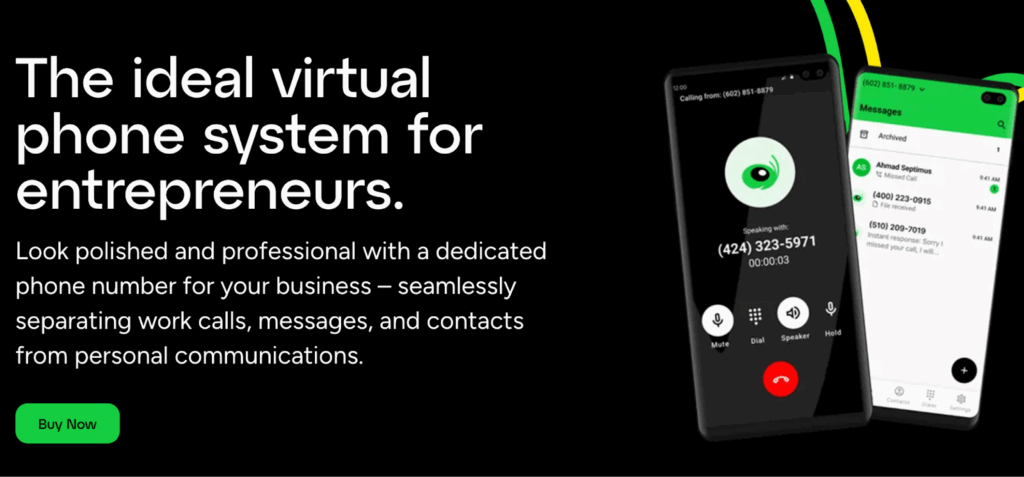
What is Grasshopper?
Grasshopper is a VoIP based business calling system built for mainly entrepreneurs and small businesses with fewer employees.
Top features of Grasshopper:
- Local, toll-free, and vanity numbers that work on existing devices
- Call forwarding, voicemail, and text messaging
- Easy mobile app and desktop app for on-the-go management
Who is it for: Freelancers, solopreneurs, and small business owners who want a second number for business use.
AI features in Grasshopper
- Grasshopper does not currently include advanced AI features.
- Focuses on simple calling, voicemail, and text solutions without automation layers.
What I liked about Grasshopper
I liked that it allows entrepreneurs to keep personal and business numbers separate without needing extra devices.
The vanity number option can also make small businesses look more professional to customers.
Its ease of use, no complicated setup, just download and go, makes it appealing to anyone without technical skills.
Drawbacks of Grasshopper:
- Lacks video conferencing features.
- Limited integrations with other software.
- Can get pricey as you add more users.
- Doesn’t include analytics or detailed reporting.
Grasshopper pricing:
Grasshopper plans start as low as $18/month/user. Scaling up with more numbers and extensions will require a higher tier plan that may reach upto $70/month
Why choose Grasshopper?
Grasshopper is lightweight, affordable, and easy to use — perfect for one-person businesses or very small teams.
_________________
#5. Vonage (Business)
- G2 Rating: 4.5/5 (975 reviews)
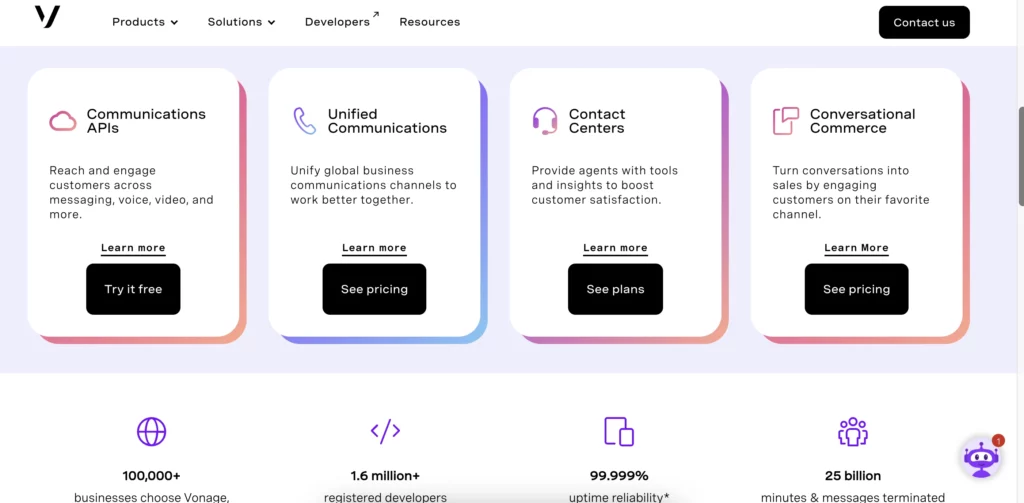
What is Vonage?
Vonage Business is a business phone system that combines calling, messaging, video and CRM integrations in one platform. It provides flexible APIs and business workflows for customer support.
Top features of Vonage
- 40+ built-in Unified communication features including call forwarding, auto-attendant, and conferencing
- Business SMS and video meetings
- CRM integrations and workflow APIs for customization
- Detailed call analytics for calling performance tracking
- Unlimited domestic calling and SMS.
Who is it for: Businesses that want integration-heavy setups with CRMs or plan to customize calling workflows.
AI features in Vonage
- AI Virtual Assistant for handling routine customer queries.
- Natural Language Understanding (NLU) to interpret caller intent.
- Conversational AI that works across voice, chat, and SMS channels.
- AI Studio tools for building automated workflows and responses.
What I liked about Vonage
Vonage impressed me with its integration power.
I liked how it connects smoothly with popular CRMs and productivity apps, giving businesses a chance to truly customize their phone system workflows.
It feels like a good fit for tech-savvy small businesses that want control and flexibility.
Drawbacks of Vonage:
- Extra features and add-ons increase costs quickly.
- User interface not as modern as newer platforms.
- Can feel overwhelming for very small teams.
- Customer support is terribly slow
Vonage pricing:
Vonage typically prices in the $20–$30 per user/month range, depending on features.
Why choose Vonage?
Vonage is highly flexible and works well for small businesses that want tailored communications workflows.
_____________
#6. Dialpad
- G2 Rating: 4.4/5 (4352 reviews)
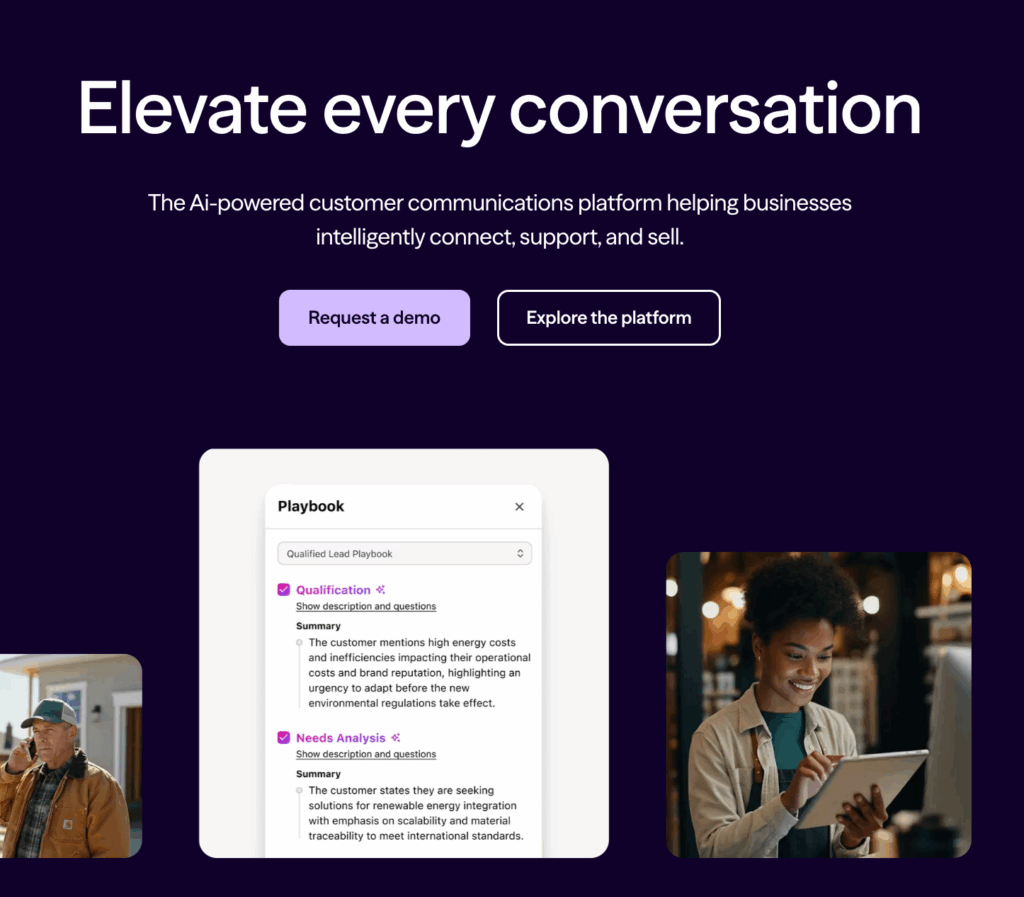
What is Dialpad?
Dialpad is a business phone system powered by AI. It provides real-time transcription and conversation insights, making it unique among business phone systems.
Top features of Dialpad
- AI-powered call transcription and live coaching
- Call summaries and post-call notes
- Messaging and collaboration tools for teams
- Auto-attendant and routing features
- CRM integrations and calling analytics
Who is it for: Sales teams, support teams, and small businesses that want AI-enhanced productivity.
AI features in Dialpad
- Live AI transcription of calls in real time.
- AI-powered coaching that provides suggestions during customer conversations.
- Automated post-call summaries and notes for follow-ups.
- Conversation intelligence to analyze trends across calls.
What I liked about Dialpad
Dialpad is one of the few tools where AI isn’t just a buzzword it’s practical.
I liked the live call transcription and real-time coaching features, which help small businesses sound more professional on customer calls.
The post-call summaries save time for sales and support teams.
Drawbacks of Dialpad
- Higher pricing than some alternatives.
- Some advanced AI features require premium tiers.
- Can be too complex for very small businesses.
- Internet quality directly impacts performance.
Dialpad pricing:
Dialpad plans typically start at $27/user/month, with AI features included on most tiers. For support and outbound sales, users need higher tier plans.
Why choose Dialpad?
Dialpad is perfect for teams that want AI-driven efficiency and deeper insights into conversations.
___________
#7. OpenPhone
- G2 Rating: 4.7/5 (2985 reviews)
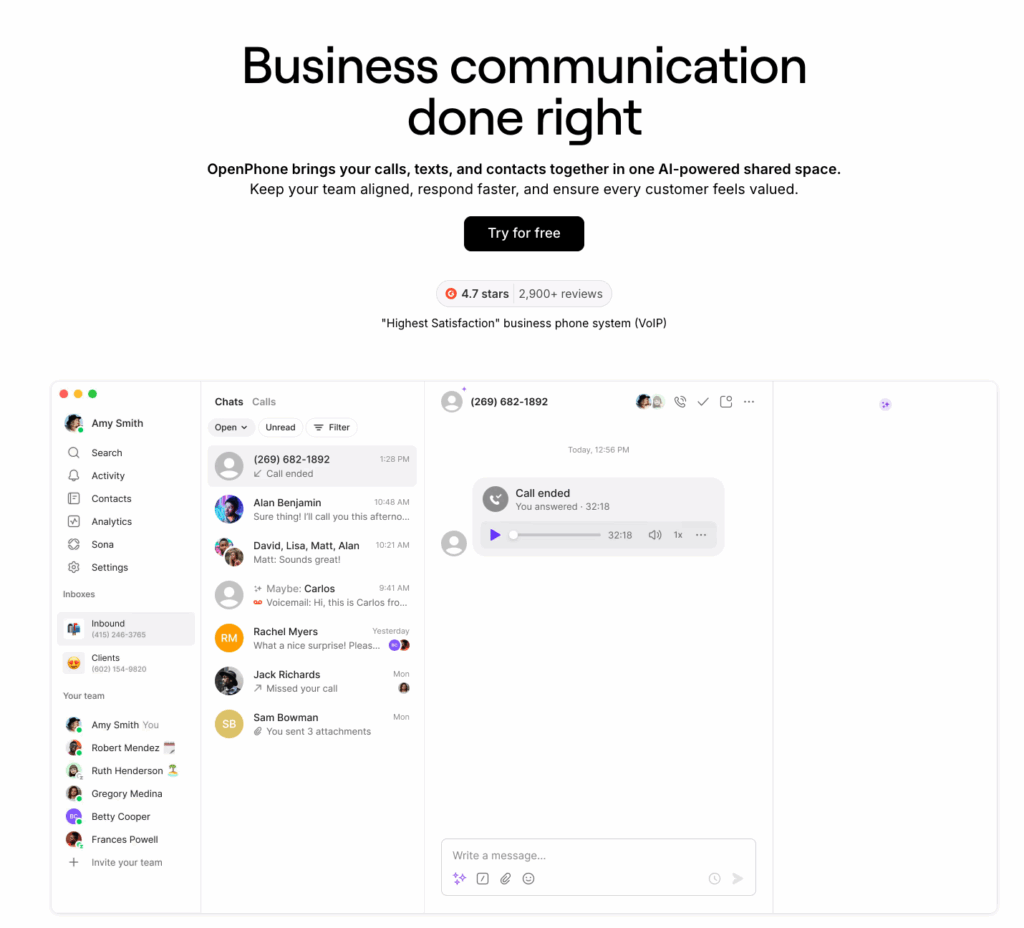
What is OpenPhone?
OpenPhone is a modern cloud phone system designed specifically for startups and entrepreneurs. Its interface is sleek, and it emphasizes SMS and team collaboration.
Top features of OpenPhone:
- Shared phone numbers and inboxes for team collaboration
- Unlimited calling and texting in the US & Canada
- AI voicemail transcription and call summaries
- Seamless integrations with CRMs, Slack, and Zapier
- Desktop and mobile apps for flexibility
Who it’s for: Startups and growing teams that rely heavily on text messaging and need shared phone numbers.
AI features in OpenPhone
- AI voicemail transcription for faster message review.
- AI-generated call summaries to save time for teams.
- Shared inbox features that improve collaboration across team members.
What I liked about OpenPhone
OpenPhone feels tailor-made for startups.
I liked its shared number functionality, which allows entire teams to collaborate on customer calls and texts.
It’s also affordable yet feature-rich, striking a balance that growing teams often struggle to find in enterprise-grade platforms.
Drawbacks of OpenPhone
- Limited international calling.
- Smaller set of advanced features compared to larger providers.
- Integrations aren’t as extensive as RingCentral or Vonage.
- No built-in video conferencing.
OpenPhone pricing:
OpenPhone plans typically start around $19/user/month, with higher tiers offering AI features and integrations.
Why choose OpenPhone?
It’s one of the most startup-friendly business phone systems, providing modern features at an affordable price.
_______________
#8. 8×8
- G2 Rating: 4.5/5 (1165 reviews)
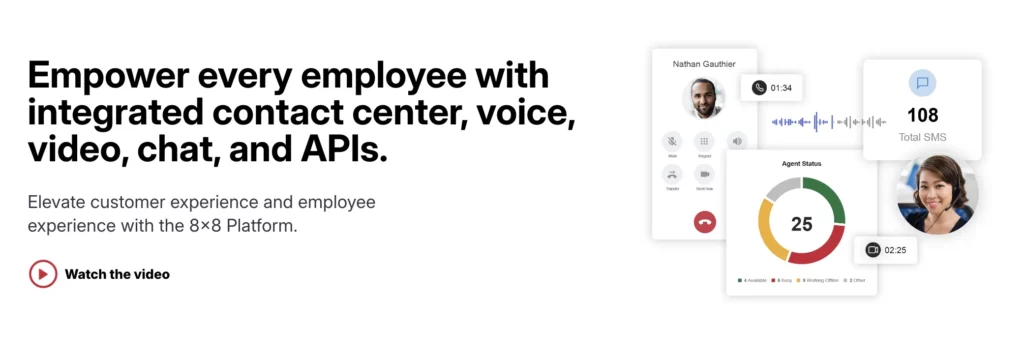
What is 8×8?
8×8 is a global business phone system known for its international calling features and broad geographic coverage.
Top features of 8×8
- Unlimited international calling to many countries (plan-dependent)
- Voicemail transcription and call recording
- Team messaging and collaboration
- AI-powered call analytics and quality monitoring
- Multi-device support across web, mobile, and desk phones
Who it is for: Small businesses that regularly deal with clients overseas or have distributed teams.
AI features in 8×8
- AI-powered call analytics to track quality and performance.
- Automated sentiment analysis of customer interactions.
- Call recording with AI-driven insights for training and compliance.
What I liked about 8×8
I liked how 8×8 makes international calling simple and cost-effective, something many other providers don’t prioritize for small businesses.
The fact that even lower-tier plans cover calls to multiple countries is a big plus for companies with global clients.
The AI-powered call analytics also stood out, helping teams monitor call quality and performance across different locations.
Drawbacks of 8×8:
- Advanced features locked in higher plans.
- Setup and onboarding can feel complex.
- Customer support is inconsistent.
- Interface is not as sleek as newer tools.
8×8 pricing:
The basic plan of 8×8 starts around $15 per user/month, with more advanced tiers offering global features and analytics.
Why choose 8×8?
8×8 offers one of the most affordable international calling solutions for small businesses.
How to find the best business phone system for a small business?
After going through all the VoIP systems, above,you might be wondering which one you should try.
So, here is a list of questions that you should ask yourself –
- What’s your budget per user/month? (VoIP typically $15–$50/user/mo).
- Do you need international calling? Choose providers with global rates and local-number coverage
- Do you need shared inboxes + team SMS?
- Which app integrations do you need?
- Do you want specific built-in AI features (e.g., transcripts, summaries)?
- Do you require mobile and desktop access?
- What is your team’s size and growth potential?
By carefully evaluating these factors, you can select the best business phone system that meets your small business needs, improves team communication, and boosts operational efficiency.
If you are still struggling, here’s a friendly suggestion.
While all the tools on this list offer strong features, dialnote stands out for its simplicity, scalability, and modern all-in-one design making it the best fit for most small businesses.
👉🏼 Join the waitlist for dialnote (We’ll get back to you as soon as we’re live, promise!)
F.A.Qs
Q. What is the best business phone system for small businesses?
The best small business phone system is dialnote, thanks to its transparent costs, AI features, and growth-friendly setup.
Q. What is the best business VoIP phone system?
dialnote is the best business VoIP phone system, combining enterprise-grade reliability with affordable, AI-powered tools.
Q. Why should small businesses use a business phone system?
Small businesses should use a business phone system to centralize communications, improve customer support, track calls, and increase team productivity with features like call routing, voicemail transcription, and AI automation.
Q. How much does a business phone system cost?
Typically $10–$40 per user per month.
Q. Which business phone system is best for remote teams?
dialnote is ideal for remote teams, offering cloud-based VoIP, mobile and desktop apps, AI-powered call management, and seamless integrations to keep teams connected from anywhere.
Q. Do I need hardware for a small business phone system?
No, most modern small business phone systems are cloud-based and work on mobile or desktop apps, so you don’t need any physical hardware to manage calls and messages.
Q. How to choose a business phone system?
Choose a business phone system by considering your team size, budget, required features, AI and automation capabilities, scalability, and integrations with CRMs, helpdesks, and collaboration tools.

